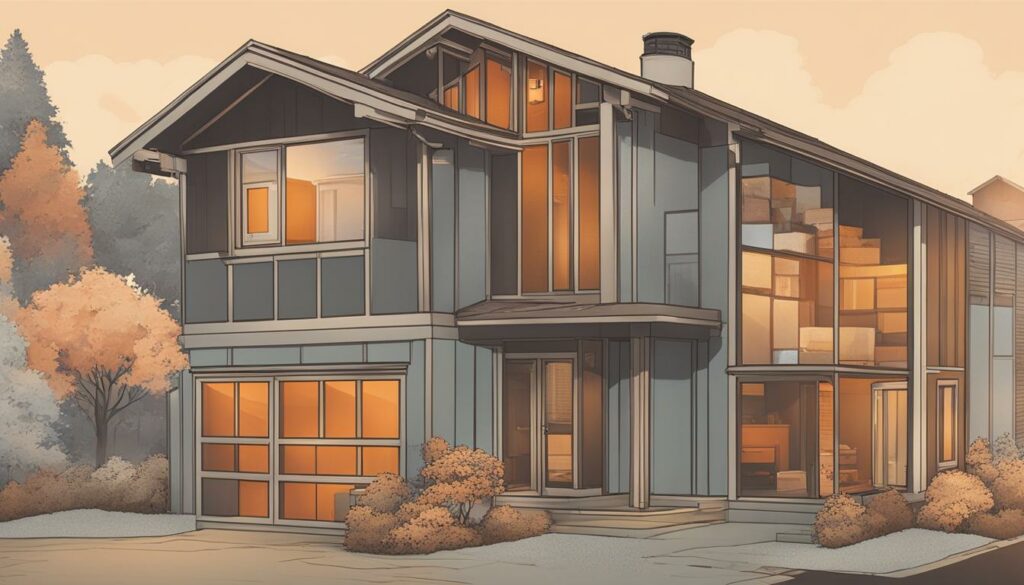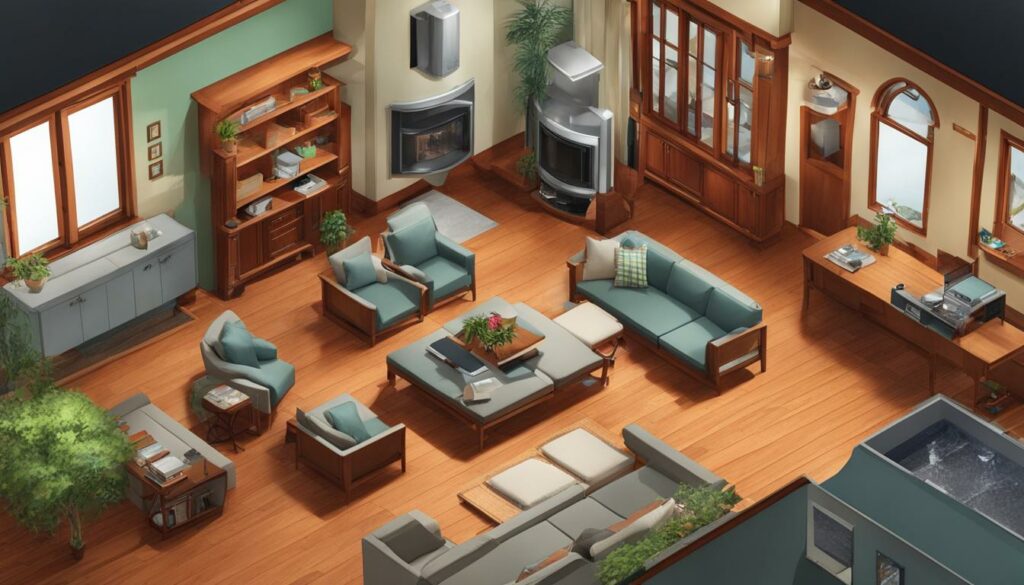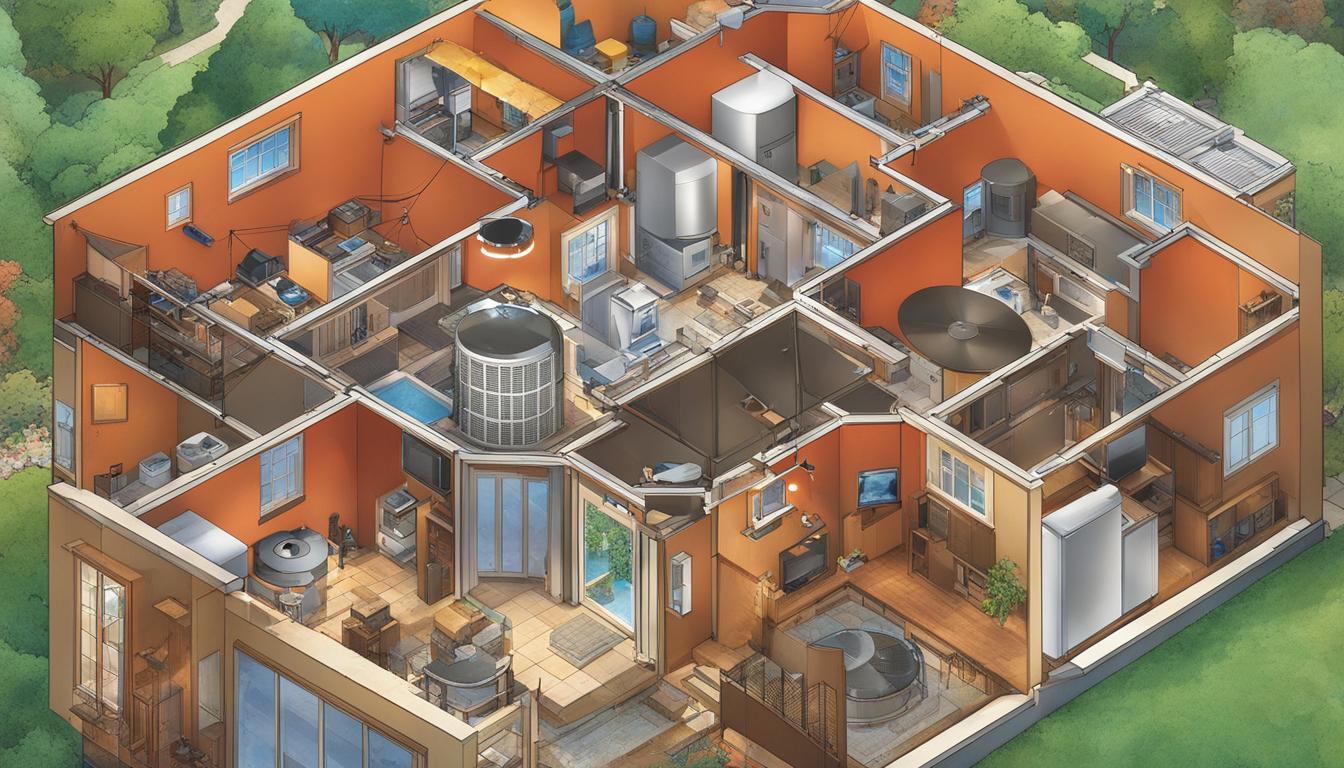Have you ever wondered how many air filters are in a house? The answer depends on various factors, such as the size of the home and the HVAC system it has. In this article, we’ll explore the ins and outs of house air filters, helping you determine the right quantity for your home.
Key Takeaways
- The number of air filters in a house depends on the HVAC system and the size of the home.
- A typical house has one air filter for the entire HVAC system, but larger or multi-unit homes may require multiple filters.
- Consult the manufacturer’s recommendations and consider factors like indoor air quality and system efficiency when determining the appropriate number of air filters.
- Regular maintenance and the use of high-quality filters are essential for clean and healthy indoor air and to protect the HVAC system.
- Investing in high-quality air filters can improve indoor air quality, reduce health risks, and extend the lifespan of the HVAC system.
Understanding the Role of Air Filters in a Home HVAC System
Air filters are an essential component of a home HVAC system, playing a crucial role in maintaining indoor air quality and protecting the system from potential damage. These filters are designed to capture and remove dust, pollen, pet dander, and other airborne particles, ensuring cleaner and healthier air inside the home. But how many air filters does a house have? Let’s delve deeper into the topic.
The number of air filters in a house depends on the size of the HVAC system and the specific requirements of the manufacturer. In general, a typical house will have one air filter for the entire HVAC system. However, larger homes or homes with multiple HVAC units may require multiple filters to ensure proper filtration throughout the living spaces. It is important to consider the size of the system itself and consult the manufacturer’s guidelines or seek professional advice to determine the appropriate size and quantity of air filters for the specific HVAC system in a house.
“The size of the air filter needed for a home HVAC system depends on the size of the system itself.”
The role of air filters is not only limited to improving indoor air quality. By trapping airborne particles, these filters help maintain the efficiency of the HVAC system and extend its lifespan. Clogged filters can restrict airflow and put unnecessary strain on the system, leading to reduced performance and potential breakdowns. Regularly checking and replacing air filters is vital to prevent clogging and ensure optimal system functionality. The frequency of filter changes varies depending on factors such as the type of filter, the level of indoor air pollution, and the manufacturer’s recommendations. It is generally recommended to check air filters every three months and replace them as necessary.
To summarize, air filters in a house play a critical role in maintaining clean and healthy indoor air while protecting the HVAC system from damage. The number of air filters required depends on the size and specific requirements of the HVAC system, with larger homes or homes with multiple units typically needing multiple filters. Regular maintenance, including checking and replacing filters, is essential to ensure the optimal performance and longevity of the HVAC system. By understanding the role and importance of air filters, homeowners can create a healthier and more comfortable indoor environment.
Table: Factors Affecting the Number of Air Filters in a House
| Factors | Description |
|---|---|
| Size of the House | Larger homes generally require multiple air filters to ensure proper filtration throughout the living spaces. |
| Number of HVAC Units | Homes with multiple HVAC units may require multiple filters to accommodate each unit. |
| Specific HVAC System Requirements | Manufacturers may have different recommendations for the number of air filters based on the specific HVAC system. |
| Presence of Pets | Homes with pets may require additional filters to address pet dander and allergens. |
| Number of Occupants | A higher number of occupants may result in increased indoor air pollution and the need for additional air filters. |
| Level of Indoor Air Pollution | Homes in areas with high pollution levels may require more air filters to ensure effective filtration. |
Factors Affecting the Number of Air Filters in a House
When determining the number of air filters needed in a house, several factors come into play. These factors can vary depending on the size and layout of the house, the number of HVAC units, and the specific requirements of the HVAC system.
In larger homes or homes with multiple HVAC units, the number of air filters needed may be higher compared to a typical house. The manufacturer’s recommendations and guidelines should be considered when determining the appropriate number of air filters.
Other factors that can impact the number of air filters required include the presence of pets and the number of occupants. Pets can contribute to increased dust and pet dander in the air, requiring more frequent filter changes. Similarly, more occupants in the house may result in higher indoor air pollution levels, necessitating more air filters.
To calculate the air filter inventory in a residence, it is essential to evaluate these factors and make an informed decision. By taking into account the unique characteristics of the house and the HVAC system, homeowners can ensure that the proper number of air filters is installed to maintain clean and healthy indoor air.

The Importance of Regular Air Filter Maintenance
Regular maintenance of air filters is crucial to ensure optimal performance and prolong the lifespan of the HVAC system. Air filters play a vital role in filtering out dust, pollen, pet dander, and other airborne particles, preventing them from circulating in the indoor air. Over time, these filters can become clogged, reducing their effectiveness and restricting airflow.
To maintain clean and healthy indoor air, it is important to check and replace air filters regularly. The frequency of filter changes depends on factors such as the type of filter, the level of indoor air pollution, and the manufacturer’s recommendations. However, a general guideline is to check air filters at least once every three months and replace them as necessary.
Table: Frequency of Air Filter Replacement
| HVAC System | Filter Type | Recommended Replacement Frequency |
|---|---|---|
| Single HVAC Unit | Standard Filter | Every 1-3 Months |
| Multiple HVAC Units | Standard Filter | Every 1-3 Months |
| Single HVAC Unit | High-Quality Filter | Every 3-6 Months |
| Multiple HVAC Units | High-Quality Filter | Every 3-6 Months |
“Regular maintenance of air filters ensures that the HVAC system operates efficiently, reducing energy consumption and utility costs. It also helps prevent the buildup of dirt and debris, which can lead to system malfunctions and costly repairs.” – HVAC expert
By regularly checking and replacing air filters, homeowners can ensure that their HVAC systems are operating at peak performance, providing clean and healthy indoor air for their families. Neglecting air filter maintenance can lead to decreased indoor air quality, increased energy consumption, and potential damage to the HVAC system. Therefore, it is important to prioritize the regular maintenance of air filters to keep the home environment comfortable and free from airborne contaminants.
The Benefits of Using High-Quality Air Filters
Using high-quality air filters in a house has numerous benefits. These filters are designed to effectively trap airborne particles and improve indoor air quality, making them an excellent investment for any residence. By reducing the presence of dust, pollen, pet dander, and other pollutants, high-quality air filters can significantly enhance the health and well-being of the occupants.
“Investing in high-quality air filters is essential for maintaining clean and healthy indoor air. These filters can help reduce the risk of respiratory problems, allergies, and other health issues caused by poor air quality.”
In addition to their positive impact on indoor air quality, high-quality air filters also play a crucial role in protecting the HVAC system. By preventing the accumulation of dust and debris, these filters help maintain optimal airflow and prevent damage to the system’s components. This, in turn, extends the lifespan of the HVAC unit and reduces the need for costly repairs.
Comparing High-Quality Air Filters with Standard Filters
| Features | High-Quality Air Filters | Standard Filters |
|---|---|---|
| Particle Filtration Efficiency | Efficiently captures a wide range of airborne particles, including smaller particles | May only capture larger particles, allowing smaller particles to circulate |
| Durability | Durable construction ensures a longer lifespan | May require more frequent replacement |
| Maintenance | Regular maintenance at recommended intervals | May need to be replaced more frequently, leading to higher maintenance costs |
| Price | Higher initial cost, but long-term savings due to extended lifespan | Lower initial cost, but may result in higher overall costs due to more frequent replacement |
Overall, using high-quality air filters in a house offers significant advantages in terms of improved indoor air quality and enhanced HVAC system performance. These filters effectively capture airborne particles, reducing the risk of respiratory issues and allergies. Additionally, they contribute to the longevity of the HVAC system, minimizing the need for repairs and replacements. With high-quality air filters, homeowners can enjoy cleaner and healthier air while ensuring the efficient operation of their HVAC system.

Conclusion
In conclusion, the number of air filters in a house varies depending on several factors. While a typical house may have one air filter for the entire HVAC system, larger homes or those with multiple units may require multiple filters. It is important to consider the size of the home, the number of HVAC units, and the specific requirements of the system when determining the appropriate number of air filters.
Consulting the manufacturer’s guidelines is essential to ensure the correct filter count. Additionally, factors such as indoor air quality, system efficiency, and maintenance requirements should be taken into account. Regular maintenance is crucial to keep the air filters functioning optimally and prolong the lifespan of the HVAC system.
Using high-quality air filters is highly recommended as they offer several benefits. These filters are more effective at trapping airborne particles, improving indoor air quality, and reducing the risk of respiratory problems and allergies. They also help protect the HVAC system from damage. Investing in quality filters not only benefits the health of the occupants but also enhances the performance of the HVAC system in the long run.
FAQ
How many air filters does a typical house have?
A typical house will have one air filter for the entire HVAC system.
Do larger homes or homes with multiple HVAC units require more air filters?
Yes, larger homes or homes with multiple HVAC units may require multiple air filters.
How do I determine the number of air filters needed in my house?
To determine the number of air filters needed, consider the number of HVAC units and consult the manufacturer’s recommendations.
How often should air filters be checked and replaced?
It is recommended to check air filters at least once every three months and replace them as necessary.
What are the benefits of using high-quality air filters?
High-quality air filters are more effective at trapping airborne particles, improving indoor air quality, and protecting the HVAC system from damage.








